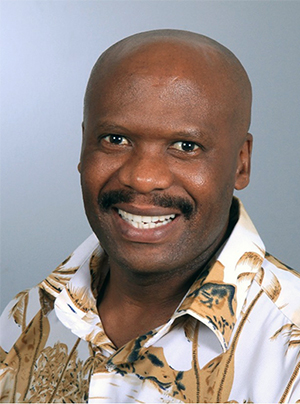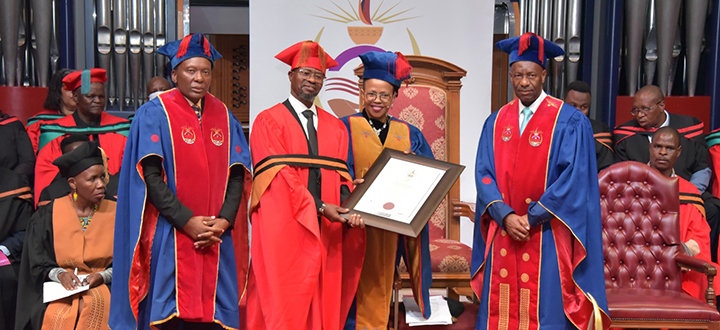College of Human Sciences
Uncovering deep-seated roots of hardship

Dr Khuze Skosana
Latest reports indicate that unemployment is more prevalent among young people than any other age group. The young people who are supposed to make an economic contribution to our country are not doing so because they are unemployed; they are not educating themselves and are not being trained.
These are Dr Khuze Skosana’s reflections when he gave some background to what motivated his doctoral research. He recently graduated with a PhD and is a lecturer in the Department of Psychology at Unisa.
Unemployment an urgent matter for the past five decades
Looking at the current high levels of unemployment, especially among young people, motivated him to investigate the unemployment issues from a psychosocial perspective. "I have observed many young people standing at the robots and the crossroads begging for food and asking for work from the drivers passing by. This is a painful sight that some of us experience almost on a daily basis."
According to Skosana, the young people of South Africa are supposed to be the driving force behind economic development and stability that our country desperately needs. Yet, they are facing high levels of unemployment that force them to be dependent on their families. Attending to the issue of unemployment has been an urgent matter for the past five decades.
Consider the psychological in combination with social perspectives
Many studies have dealt with the unemployment issue by focusing on the psychological, economic, physical and social effects of unemployment separately. Skosana’s research considers the psychological in combination with social perspectives. Combining the psychological and social aspects of unemployment helped him to uncover the deep-seated roots of hardship experienced by unemployed young adults. Part of his findings revealed that some families, spouses or partners and friends are not necessarily supportive towards an unemployed person; it also revealed the pertinent roles that families, partners and friends can play to support the unemployed, and that people have different reactions to the unemployed.
Skosana believes that it is important to look at the issue of unemployment (or any research issue) from a deeper perspective that would provide much more detailed information. By focusing on the effects of unemployment from a psychosocial perspective, not only provided him with more detailed information on what people go through once they become unemployed, but also how society treats or perceives them in terms of their unemployment status. Skosana believes that, based on the depth of this information, it becomes possible to develop intervention strategies that would benefit not only the individuals, but also society more indirectly.
Society suffers when its young people are unemployed
According to Skosana, unemployment is considered to be an individual problem when it is actually a social problem. Based on the results of his PhD study, society has a much more important and supportive role to play in reducing the high levels of unemployment in the country. For Skosana, it is important for society to not discriminate or ill-treat the unemployed but to work on changing the negative perceptions of the unemployed, at society level which can help them (the unemployed) cope better with their unemployment status. "We should not treat unemployment as a death sentence," he said.
Skosana acknowledges that some people are able to change their unemployment status and help their families and partners financially. However, he also noted that the main challenge is that jobs are not available; a downside that not only puts the unemployed young people at risk, but also their families and partners. "Society at large suffers when its young people are unemployed," he says.
Support during periods of unemployment cannot be overemphasised
Further research results from Skosana’s study indicated that some families are supportive towards unemployed members, while others treat them like outcasts. For example, in some families, relationship disintegration becomes evident during unemployment. The unemployed members find themselves having to rely on their partners and friends for support. Some indicated that they had lost friends and partners when they became unemployed. Skosana noted that these issues were mediated by the types of relationships they had prior to being unemployed. This leads him to conclude that the necessity of support during periods of unemployment cannot be overemphasised.
Furthermore, Skosana stated that unemployment tends to change the way in which people perceive the world. He posits that certain periods of unemployment greatly affect our worldview and our place in it. Considering the current state created by unemployment, it is no wonder that some people lose hope for a better future. A lack of skills and low level of education, coupled with a host of other social inequalities, contribute to the negative perception of the worldview. Despite all these issues, some people may believe that the world is getting better and they still hope for a better future.
Just like many other research journeys, Skosana’s was not without its own challenges, among which were the availability of research participants and their expectations of the research, which had to be adequately dealt with to eradicate any misconceptions participants may have had about the research study. Other challenges included the challenge to balance family and work life.
"Sometimes I had to work until late at night to finish a particular aspect of the research. Managing my time effectively was important to stay focused."
* By Katlego Pilane, Administrative Officer, Department of Psychology
Publish date: 2021-08-27 00:00:00.0

 Young Unisa doctoral graduate joins elite Lindau Nobel Laureate group
Young Unisa doctoral graduate joins elite Lindau Nobel Laureate group
 Education MEC addresses Unisa autism seminar
Education MEC addresses Unisa autism seminar
 Seven Unisans nominated for the NSTF-South32 Awards 2023/2024
Seven Unisans nominated for the NSTF-South32 Awards 2023/2024
 Unisa awards posthumous honorary doctorate to literary maven, OK Matsepe
Unisa awards posthumous honorary doctorate to literary maven, OK Matsepe
 From humble beginnings to academic leadership
From humble beginnings to academic leadership